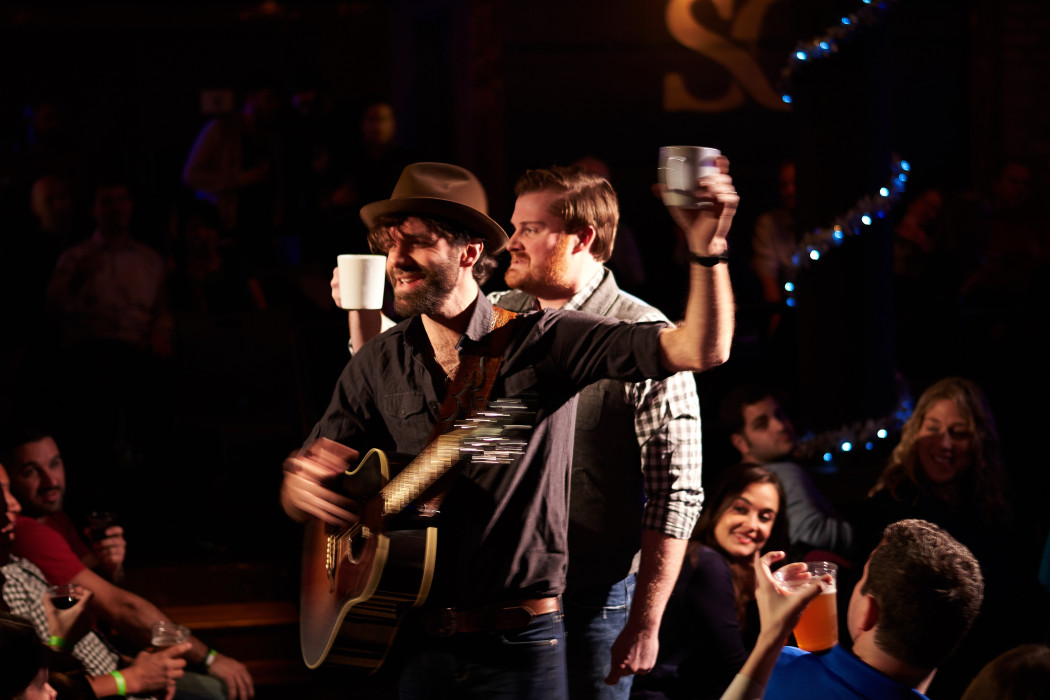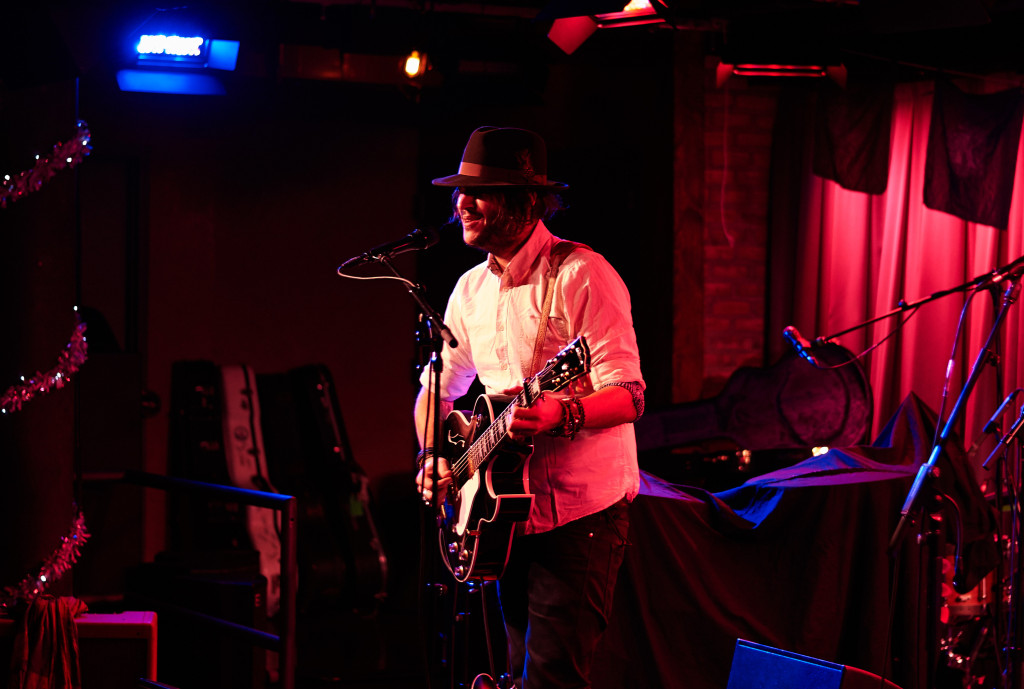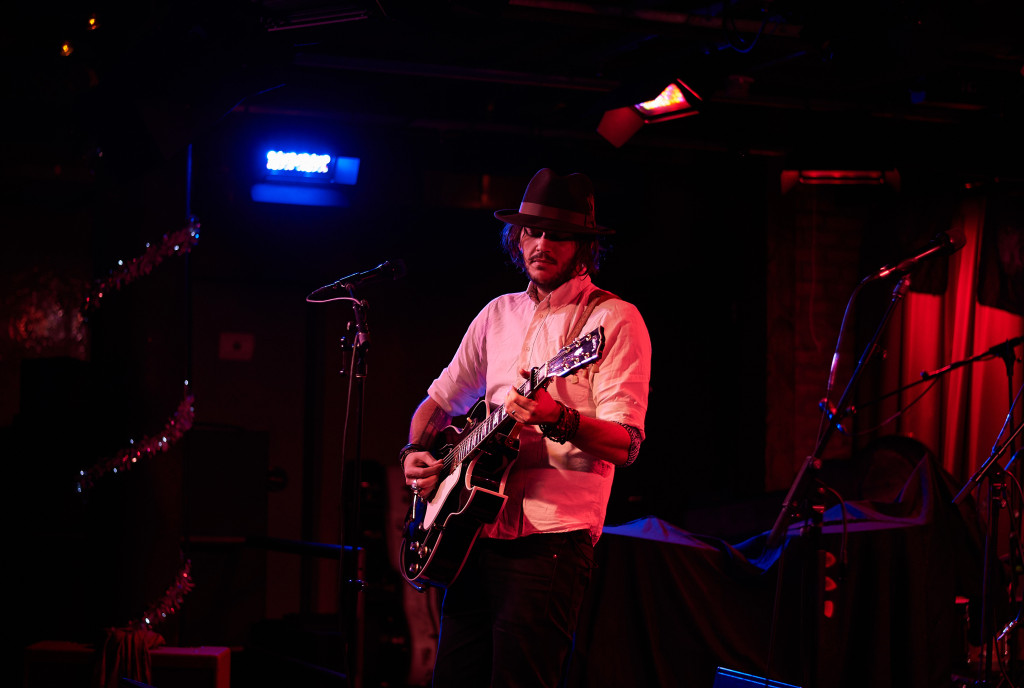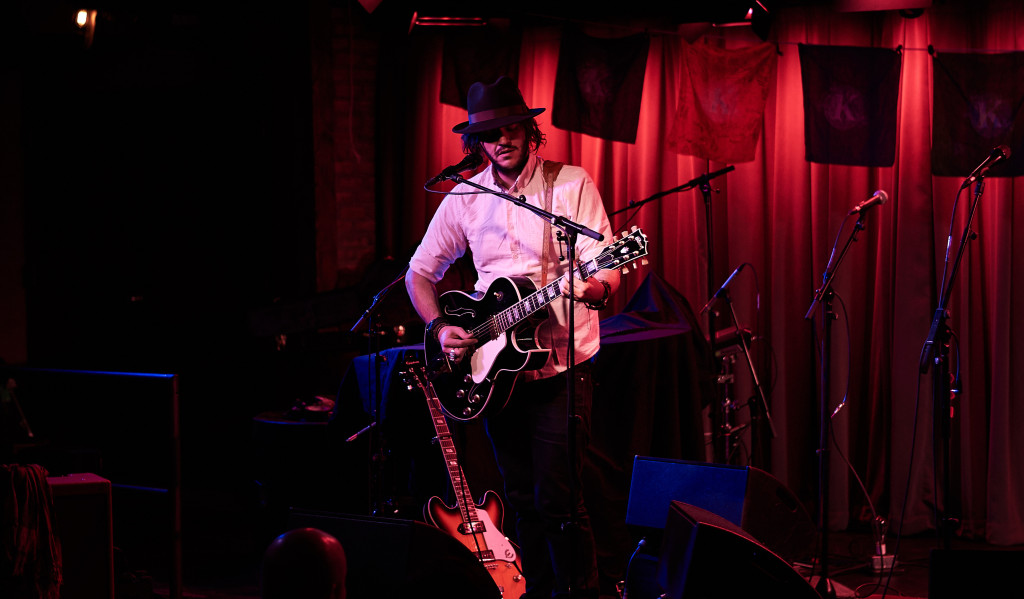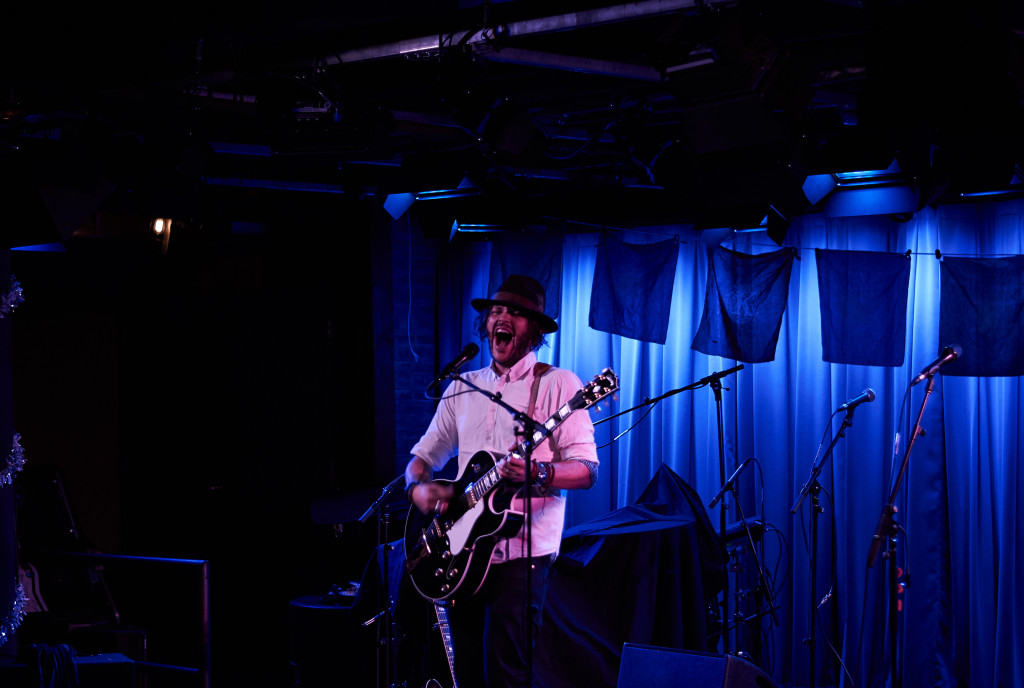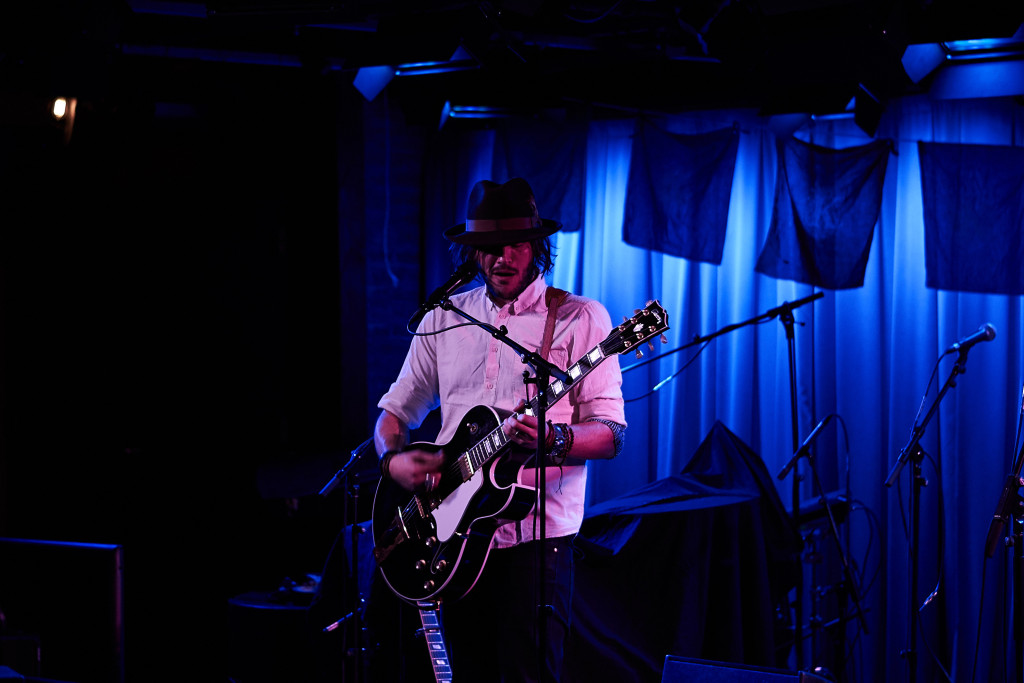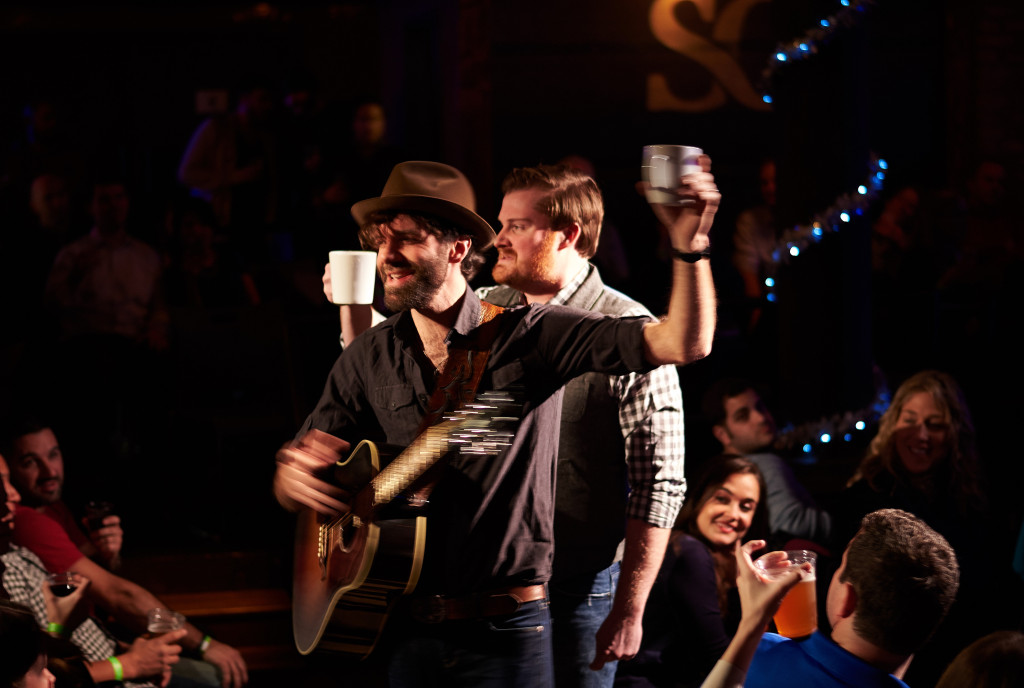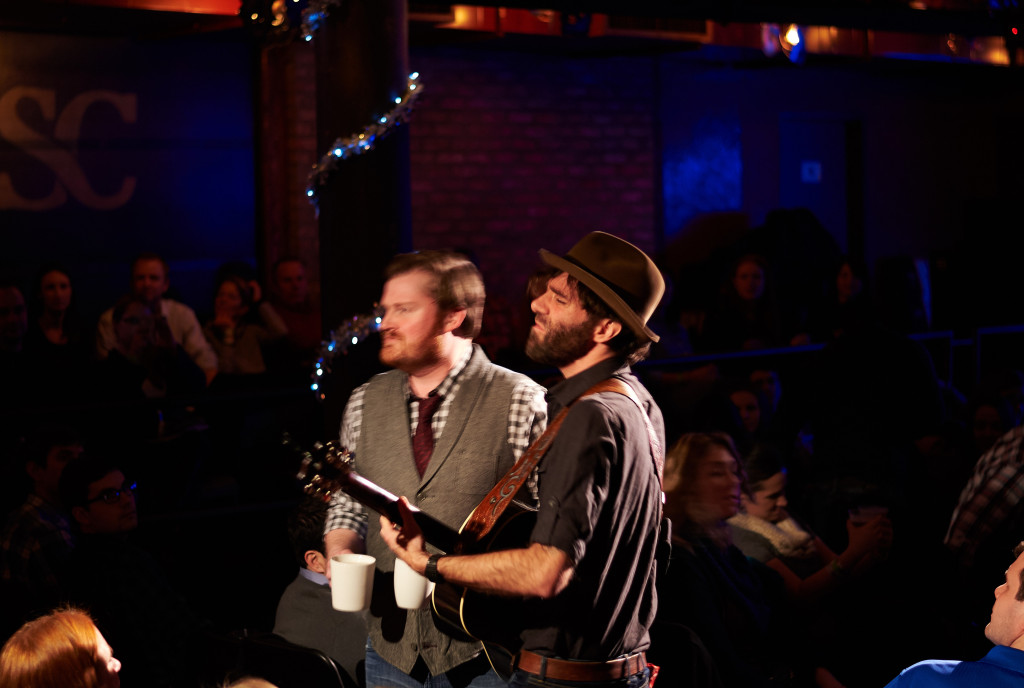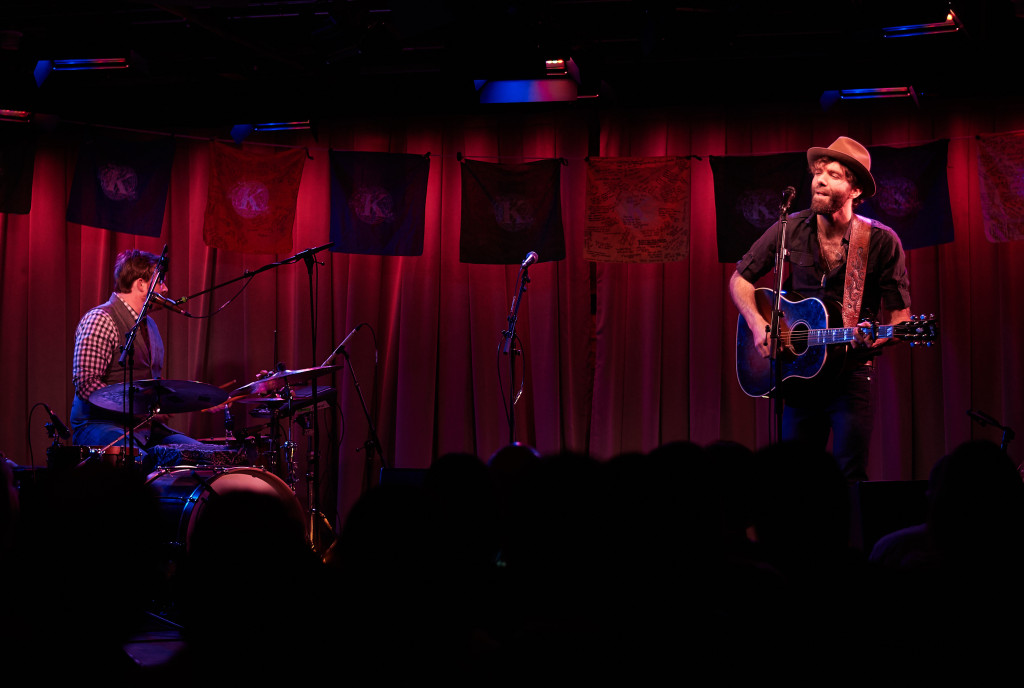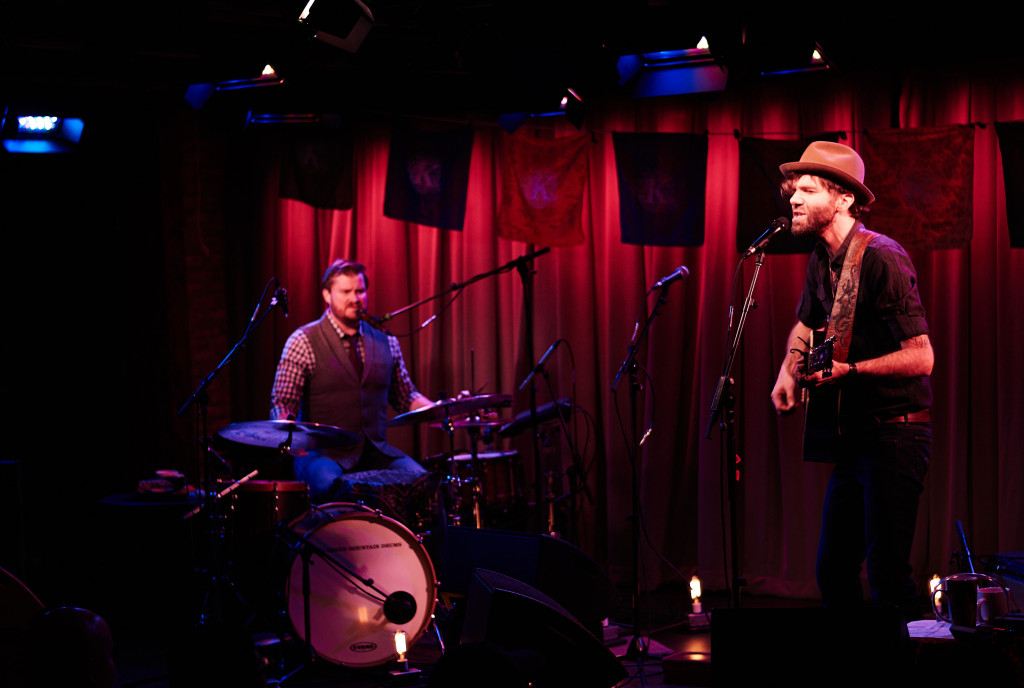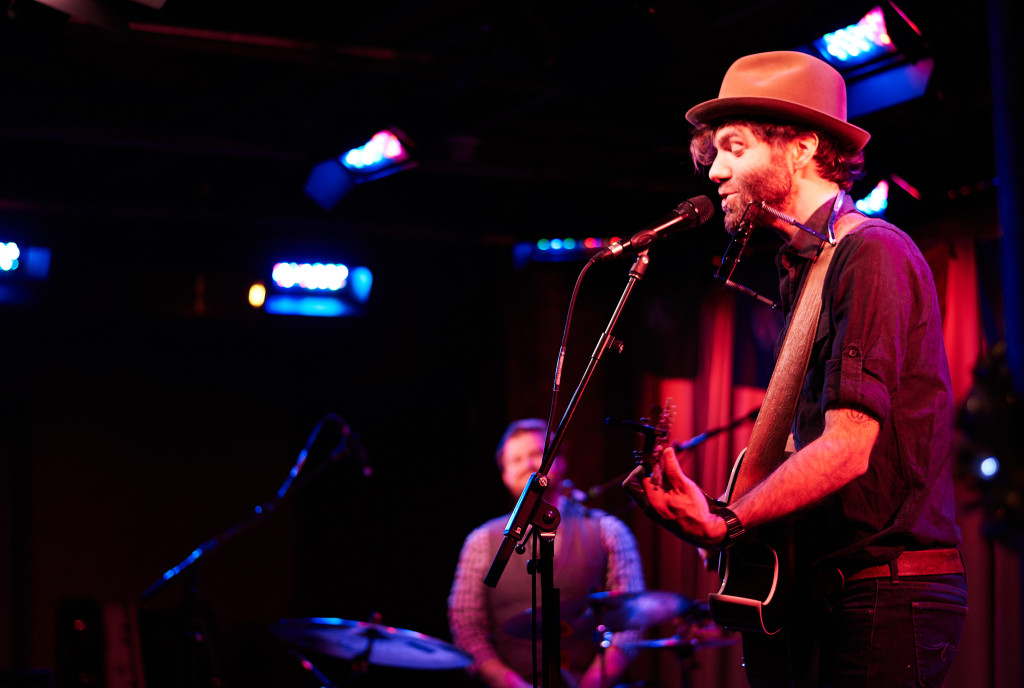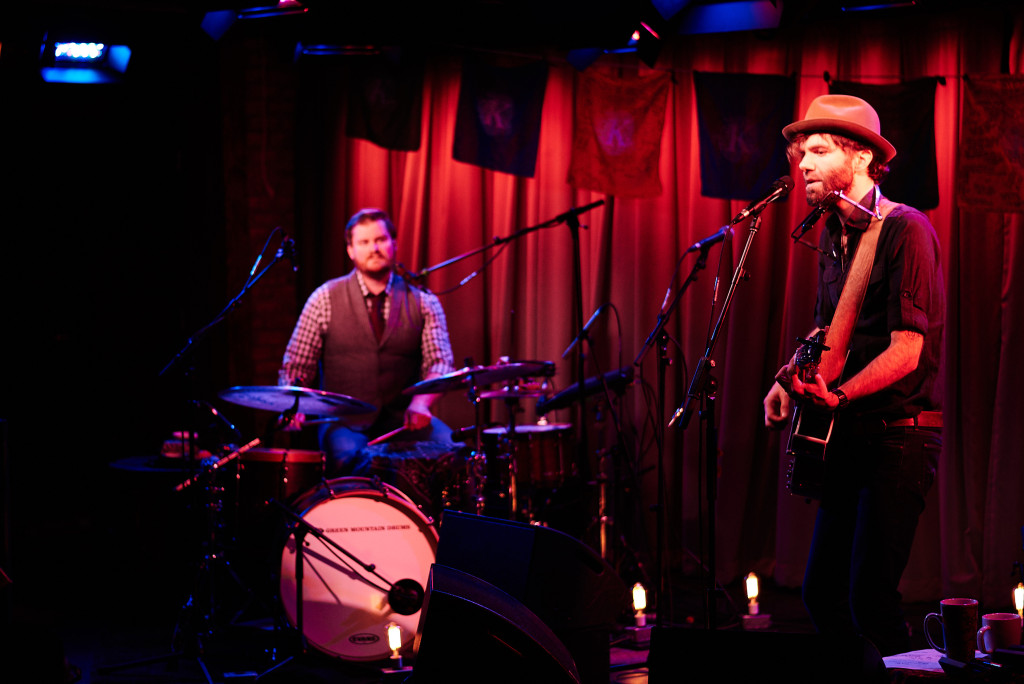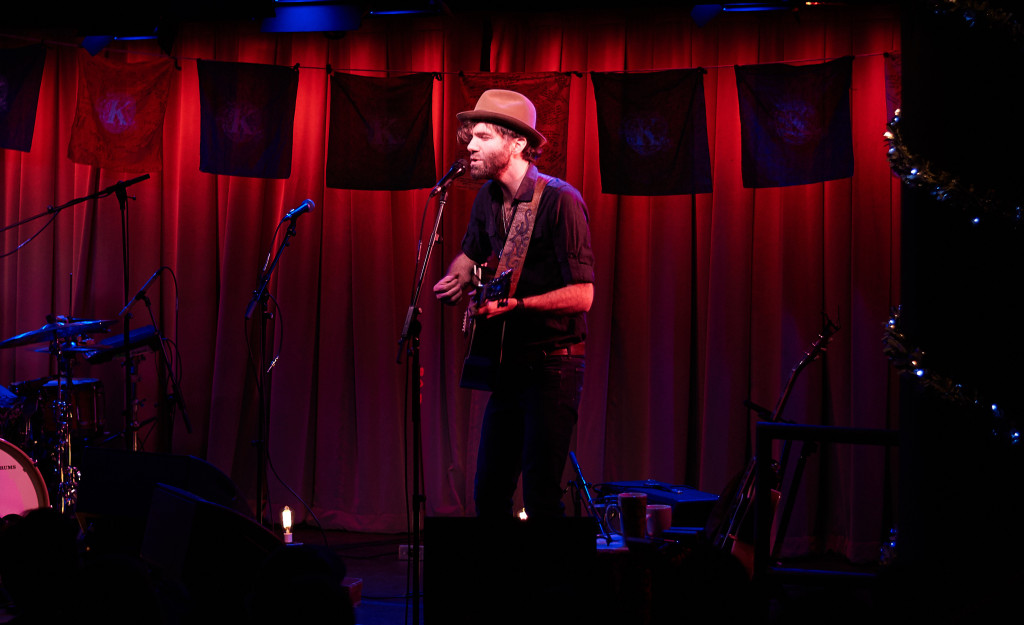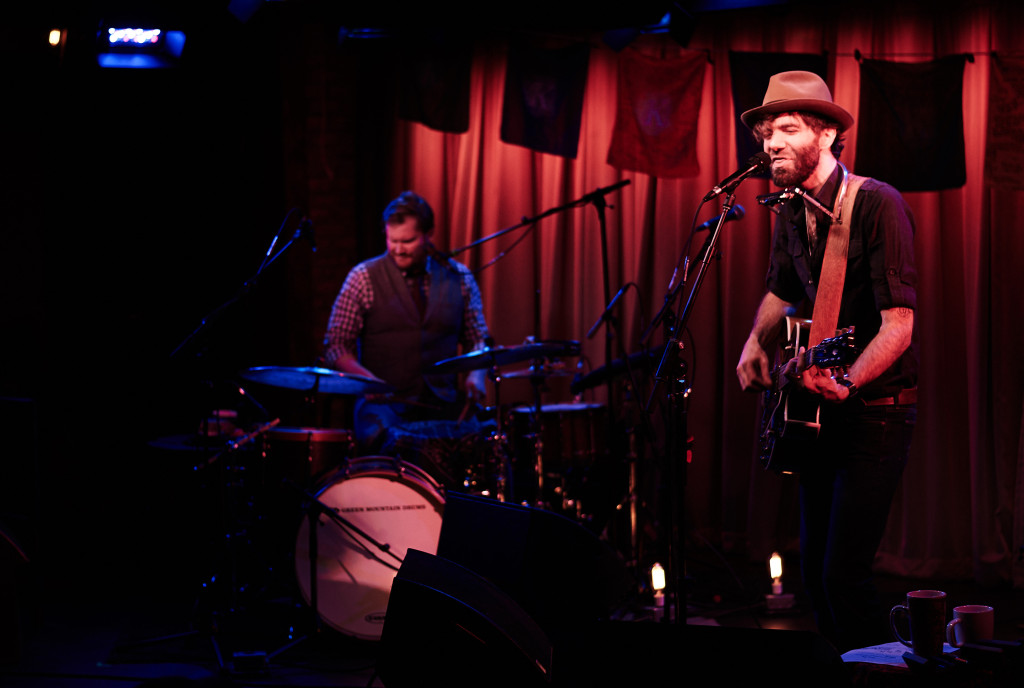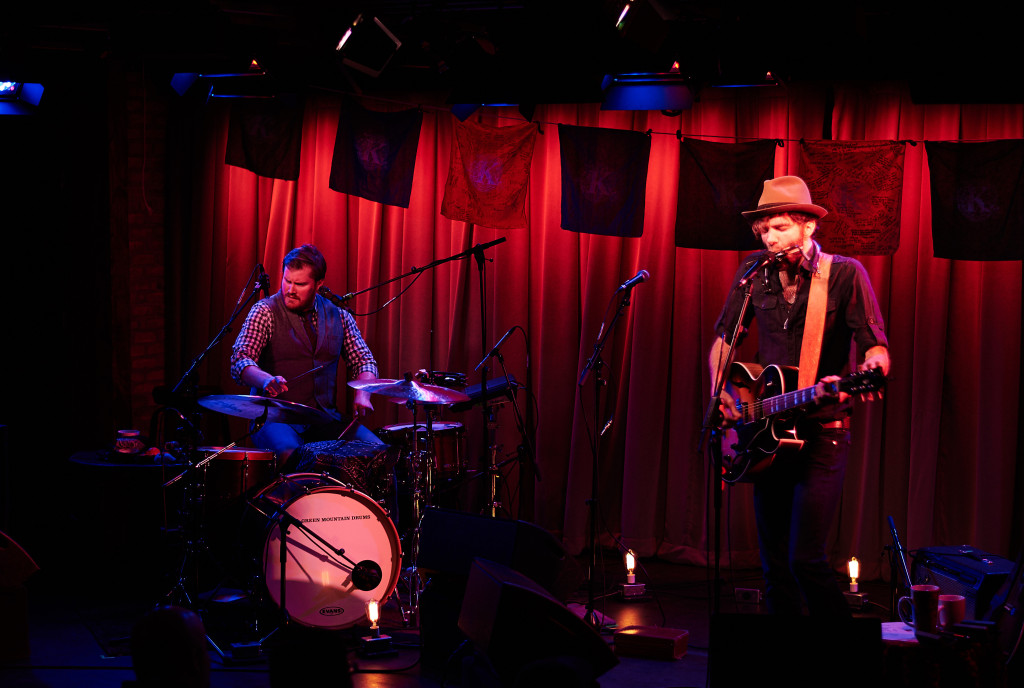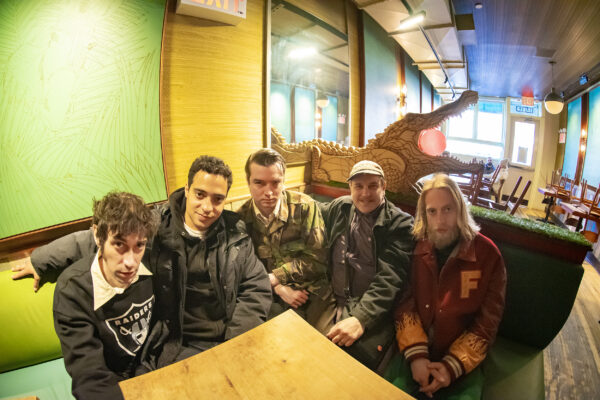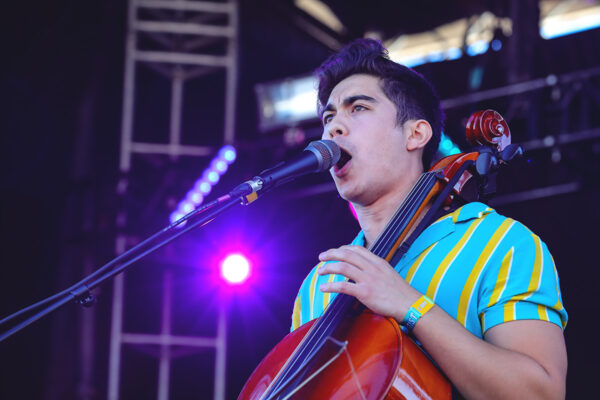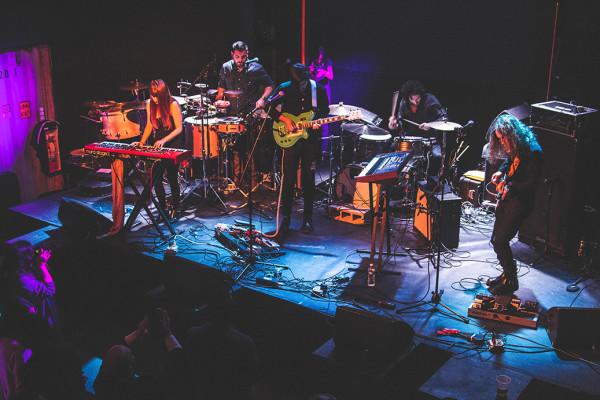Special performers bring special performances. That’s just the way it was for Stephen Kellogg on Saturday night, as his second of two nights in NYC at SubCulture featured the veteran Americana rocker playing songs from his decade-long career for a sold out crowd. Having toured for a decade with his band The Sixers, it was special seeing Stephen on stage with just himself and a drummer. Since the announcement that The Sixers would be going on hiatus two years ago he’s been making the rounds as a mostly solo or duet style showman. Before Stephen took to the stage, singer/songwriter Ben Fields warmed up the early arriving crowd with some tasty tunes.
Always a performer to get out in the crowd with his musical friends, his entrance from the behind the bar to the middle of the audience reminded everyone in attendance that Stephen’s music has always been music of the people, and he doesn’t need to be up on a stage in the spotlight for his performances to connect with others.
Opening his set with “Lost & Found” from his 2013 solo album Blunderstone Rookery, he spent his set mixing songs from his newer tunes with fan favorites from the Sixers years with “Such A Way,” and “Start The Day Early.” Canadian fiddler Miranda Mulholland, joined Stephen on stage for a few songs, and easily held her own with a pretty badass solo during “The Bear.” The rest of the set included a handful of familiar jams including; “Glassjaw Boxer,” “My Favorite Place,” “Gravity,” “4th of July,” and ended his set with “Milwaukee.”
His encore included heartfelt tribute to the victims of Sandyhook Elementary shootings, which took place two years ago this week in Stephen’s hometown before going into “Thanksgiving,” then closed out with “See You Later, See You Soon.”
Stephen was kind enough to hang out earlier on in the afternoon to talk about the current tour, his upcoming solo album, and what he enjoys about coming to NYC. In the process of making some tea to help take care of some weary vocal muscles, that didn’t stop Stephen from being able to give a great interview and ultimately a great performance.
P&W: You’re on the tail end of a mostly sold-out tour, how’s it been?
SK: It’s been great, it’s been really awesome. I think it’s definitely one of my favorites of the last few years and probably one of my favorites ever.
P&W: You’re using the hashtag #SKLiveRequests on this tour, how often has that been influencing your show every night?
SK: You know, every time someone actually makes a request, I do feel seriously compelled to consider it and try to fit it in. The original idea was, okay let’s use this request thing, then as the tour took shape what kind of caught fire in my mind was the idea of just changing the set completely every night. I used to do that in the beginning of my career, and I kind of got out of the habit of that because it’s hard to figure out a whole new thing every night. You have to be really comfortable musically and there’s a certain simplicity to this tour with just me and Rob. So I still take the requests to mind when people use them, but this has really been more about seeing how much we can switch it up every night. Twelve of the eighteen songs will be different than what we played here last night.
P&W: That seems to work perfectly with the title of the tour, Every Night’s A Little Different Tour 2014
SK: Right. And I’ve been accused by my manager of having it overly-literal but it still seems cool and fun to do.
P&W: Tonight’s your second of two nights here, how was night one?
SK: It was awesome.
P&W: What do you like most about playing shows here in the city?
SK: I feel like New Yorkers demand a lot out of you. They definitely want your best, and I like that, I’m always exhausted when I leave here. It’s one of the bigger cities in the world, there’s lots of people, and lots of energy. Not every show here I’ve done has been total bliss over the years, but I’ve had many of my most magical shows in New York and I think it’s that energy I feed off of. I mean people don’t really comprehend how the setting affects the art and the artist. Like people who have seen me play in Lawrence, KS probably have a different impression of what I do than people who see me in a bigger city.
P&W: Speaking of other cities, South West North East is a new album you’re working on via crowd funding. It’s going to be a four-part album with four producers, and recorded in four different areas of the country. What brought this unique project about?
SK: Over the last ten years everything I’ve put out has been on labels, four different ones actually. In the end though with the way things have gone towards streaming these days, my deals were made so that there’s no income participation on my end from streaming. So that’s a weird thing when you’ve got four kids, you’re thirty-eight years old, and you go “Okay so the last ten years of work, I’ve generated very little of the revenue from my albums that will ever make it to me.” You have to start thinking about how you’re going to feed your family, which definitely ups the desirability to owning your own records.
P&W: Does the crowd funding side of the project definitely help the project?
SK: To me crowd funding has always been a little like I don’t want to be in debt to somebody because they paid for it, I want the music to be what I’m offering. It took me a minute to get over that, but so much of what this has brought about is that stigma has gone away and shown the people that have been so enthusiastic about what we’re doing and say to them; “Hey what can I do for you guys that’s going to enhance your experience and help me make a record that I can own and when I’m gone can keep taking care of my family?”
P&W: Touching on the label side of things since you brought it up, some artists like Taylor Swift have made their stance on how they feel about streaming and what an artist deserves, and some like Dave Grohl have made an argument against her saying if you go out and play and you’re good enough, the fans will take care of you. Regardless, it definitely can be tough either way unless you’re constantly touring or have copyright royalties coming in. What’s you’re stance in that argument?
SK: Yeah if definitely feels that way. We’re dealing with way less people than we used to deal with but they’re way more passionate and involved. I’ve never doubted that if you take care of the art, that the art will take care of you. I think it’s a little silly to rail against Spotify at this point. It’s a good medium that works for a lot of people. I’ll never forget my daughters saying “Wait, this is like iTunes, but it’s free??” Something like that is hard to argue with. It’s the same progression though as when singles changed to records in the fifties. The industry just needs to square itself up and find some way be compensated. I do believe it’s going to right itself. I’m just trying to do good work and ride the waves in the mean time.
P&W: Have you started tracking for the new album yet?
SK: Nope, we start January 8th. After tonight we’re taking off until Christmas, then we’ve got three final tour dates after that. The studio will start up just after the new year and I’ll be in there a lot for about the first four months of 2015.
P&W: Do you have your areas of the country/cities picked out?
SK: In the south I’m doing Nashville and Atlanta with Travis McNabb and Brandon Bush who were from the band Sugarland producing for those sessions. I’m doing east in Washington D.C., I’m doing north in Woodstock, NY with Josh Kauffman, and I’m doing west in Boulder, CO with Gregory Alan Isakov whom I just toured with and was blown away by him.
P&W: Why’d you pick those locations?
SK: It was more about the people I wanted to work with, then just finding the locations that they wanted to work in. At one point I was going to work with Mike Mogis in Nebraksa for the west record and we were all laughing at the idea that it wasn’t too far west enough. I wasn’t trying to focus too much on the geography, rather than it just a way to picture it all. As it works out we’re going to be in locations that just happen to fit the bill. It was more about finding the people I wanted to work with.
P&W: You’ve been playing shows and doing stuff without The Sixers for about two years now, and you’d been a part of that band for a decade previously. Can you tell a difference of who you are as a musician and songwriter without being part of that group than when you were with them?
SK: I’ll be totally honest Tommy, the first year that I did without them, I did a less good version of songs than when I was with them. I just didn’t know how to do it with people I hadn’t played with for ten years. It was hard for me to get into the music and I wasn’t the greatest bandleader, you kind of struggle though it. Like anything growth-related, it’s good and you know it’s good because you’re learning but it hurts a little bit. That was the trademark of 2013.
Now it’s become more about the songs. The Sixers were a fun, creative, and dynamic group of people, but my shows tend to center around the songs themselves and the story I’m trying to tell, and less on the personalities of the band. One side isn’t better than the other, but this is the most comfortable I’ve ever been because what I’m doing is the purest version of what I want to be doing. It’s had a pretty massive impact though and this tour has been a culmination of that. It’s two guys, there are no guitar solos, we don’t have a lot of flash, and it’s just the tune and some occasional harmonies. Rob’s (Griffith) done an amazing job making it dynamic.
P&W: Has it made you really appreciate and understand some of these other artists who constantly change their backing band on different tours and projects but still make all their songs come alive every night?
SK: Yeah you realize what an art is it to be able to create new things. I’m very, very proud of what Rob and I have achieved on this tour. This is so different than anything I’ve ever done, yet equally fulfilling. Yes you do respect the artists that change the way they present their music regularly and do it well whether it’s Springsteen or Mayer or whoever. You realize it’s an art and an important thing to do so I’m really pleased and it gives me a lot of confidence for what’s possible in the future. You don’t really know how fans are going to take it but this tour’s been great.
P&W: What do you like to do when you’re here in New York on a tour stop?
SK: (Laughs) I guess eat. I come in to New York every so often to see shows and hang out just because I don’t live too far from here. If I’m here for a show though then I know I’m going to be able to eat well. You can walk into almost anyplace, anywhere and you know it’s going to be amazing. I don’t know that there’s better food anywhere else in the world.
P&W: What’s your favorite neighborhood?
SK: Oh man, I don’t know I really dig it all. I’ve hung out a lot in this neighborhood (NoHo/East Village). I like Brooklyn, it’s just a pain in the ass to get there. I always like that area and I have friends there. I always get lost when I try to get there though.
Article by: Tom Shackleford
Photos by: Nicholas Fallon

